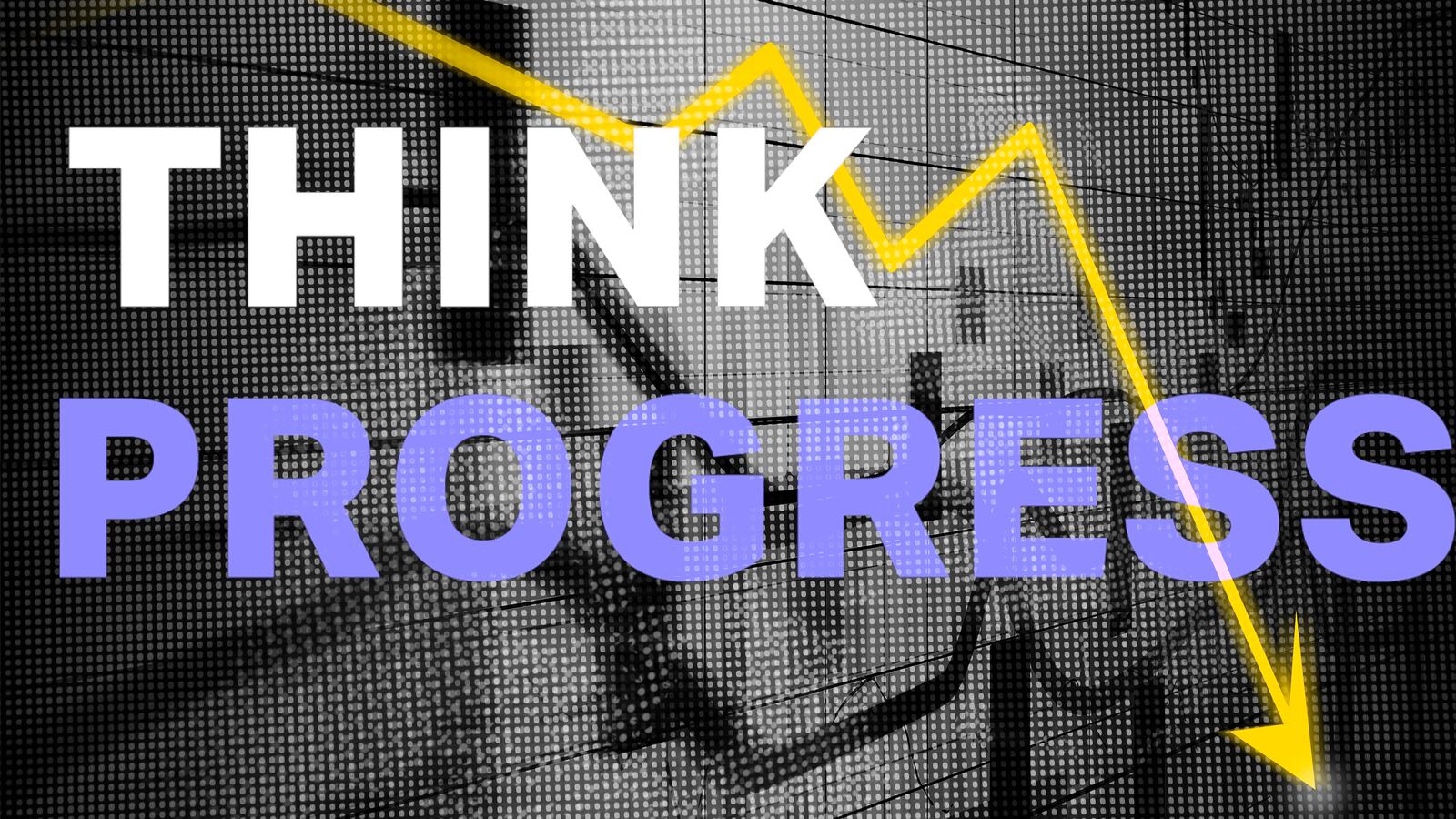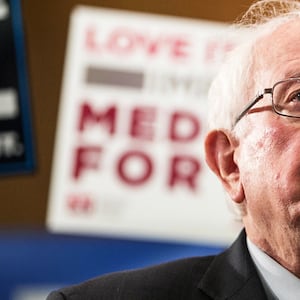ThinkProgress, the website that is a project of the Democratic Party’s primary think tank, is facing dire financial troubles and bleeding staff, according to primary-source documents viewed by The Daily Beast.
A budget document provided to ThinkProgress management and obtained by The Daily Beast showed that the website was expecting a roughly $3 million gulf between revenue and expenses for 2019. ThinkProgress has never been a revenue generator, and has often made up for its deficits through fundraising efforts and funds from its mothership entity, the Center for American Progress (CAP). But the current outlook is significantly worse than ever before.
According to the document, advertising revenue is projected to fall $350,000 short of what was budgeted this year, and online contributions are expected to fall short by nearly $180,000. The site is projected to have about $64,000 in grant revenue (money derived from donations to CAP and meant for coverage by ThinkProgress) in 2019. That’s roughly $60,000 short of what it had budgeted for the year and roughly $540,000 less than it received in 2018.
In the face of these falling revenue streams, ThinkProgress has seen payroll drop by 12 percent from its peak level in 2019 and “salary growth” by 5 percent, according to the document. Among those leaving is the site’s managing editor, Tara Culp-Ressler, who announced her departure last week.
The numbers paint a grim picture for one of the better-known, unapologetically progressive media platforms. And it has been exacerbated by what a source described as a failure of leadership at CAP to provide answers about “the short- and long-term future of the site.” ThinkProgress is editorially independent from CAP and the accompanying Center for American Progress Action Fund, but operates within its organizational umbrella.
“Unfortunately, ThinkProgress has had a large and growing budget gap for going on two years now,” Navin Nayak, executive director of the Center for American Progress Action Fund, told The Daily Beast. “Like most media organizations, ThinkProgress has relied on advertising revenue as a major source of funding, increasingly subject to the behavior of social-media platforms and their decisions on news distribution. As with many other digital media organizations, 2017 and 2018 were particularly challenging years in this regard, as ThinkProgress experienced a 40 percent drop in ad revenue over just one year, creating an inevitable budgetary strain.”
Management for ThinkProgress held a two-hour meeting with Nayak on Wednesday afternoon to discuss financial matters, according to a source at the outlet who requested anonymity. In a Thursday morning email to staff, viewed by The Daily Beast, management stressed that the “financial outlook has not improved in 2019 as CAP hoped it would” and that leadership at CAP plans to provide additional information about a path forward this month. According to the email, Nayak said he did not want to provide a lot of specifics at this current moment, so as not to “speculate.”
Sources at CAP and ThinkProgress told The Daily Beast that Nayak has had to engage in a series of “blunt” conversations with staffers at the website, telling them they should be looking for other jobs. These conversations took place even as the site’s union negotiated a contract at the end of 2018.
“As these challenges emerged, CAP Action Fund has been transparent with ThinkProgress staff, including implementing and explaining the need for a hiring freeze early in 2018 and providing managers and the union a full account of the financial pressures facing ThinkProgress in the fall of 2018,” said Nayak. “Indeed, in fall of 2018, we shared with the ThinkProgress union that the situation was so concerning that actions of some kind would be needed. The budget situation has only grown worse since.”
ThinkProgress launched in 2005 and quickly made a name for itself as a liberal-minded blog and sharp critic of the George W. Bush administration. Along the way, it became a launching pad for prominent political and journalism careers. Its former editor in chief, Faiz Shakir, is Sen. Bernie Sanders’ (I-VT) 2020 campaign manager.
The site seemed poised for a boom during the Trump years, when content for a liberal-minded outlet appeared bountiful. Instead, the road has been rocky. When a number of fairly large donations came into CAP following the 2016 election, ThinkProgress staffed up, ballooning its ranks to 40 people at one point, a source familiar with internal operations said. But those were one-time donations and as traffic declined—in part, several sources say, because of changes to Facebook’s algorithm—and revenue fell, there was not enough money to sustain the higher payroll.
According to a source at ThinkProgress, the site is already in a state of “slow attrition.” Four people, the source said, have left this year. Culp-Ressler’s announced departure makes five, though she remains on staff at the moment. A source said the number is expected to drop further by the end of the second quarter.
Complicating matters further, several sources say, has been internal tension over some high-profile stories. Chief among them was a piece ThinkProgress posted in April on Sanders’ personal wealth, which had accumulated during the latter stages of his career thanks to book sales. The senator responded to that piece (and accompanying video) with a highly publicized letter lacerating CAP for accepting corporate donations and suggesting that ThinkProgress was doing the bidding of those donors.
In the subsequent days, some members of the ThinkProgress staff began expressing concern about Editor in Chief Jodi Enda’s handling of the fallout. In early May, sources told The Daily Beast, the ThinkProgress writers’ union held a meeting at which the lead author on the Sanders item, Jessica Goldstein, accused Enda of making edits to the piece without telling her, and others complained that hours had passed without a correction note being appended. Enda said she apologized for the matter, publicly and privately. But the union members drafted a letter to her later that month in which they expressed concern that she had not stood “in solidarity” with Goldstein, who did not offer comment for this story.
“[M]orale is low across the team as we wrestle with lost trust and an unclear vision,” the letter read. “After careful consideration over how best to address our shared concerns, we write to you today with the hope that we can reignite the passion that brought us all here and work together to build a promising new future for ThinkProgress.”
Enda acknowledged to The Daily Beast that edits were made and said she regretted not immediately alerting the writer to the changes, though she noted that as editor in chief it was her job to make such alterations to stories as she thought were needed. Additionally, she said she removed physical descriptions of Sanders as she had “long disapproved of similar descriptions of women.” As for the direction of the site in general, she admitted that it found itself in a difficult moment.
“I joined ThinkProgress in December with the goal of turning it into a stronger journalistic entity by deepening the reporting, improving the writing, and focusing on issues on which we could have greater impact,” she said. “Toward that end, I worked with senior editors to restructure the newsroom, create some new beats and change others. Change is always hard, and while many people have embraced it enthusiastically, others have not. That’s unfortunate, but not surprising. I’m proud that we have made great strides, even while dealing with these financial challenges.”
Not everyone in the union has been critical of Enda’s stewardship, during which she has tried to steer the site toward a more traditional news-gathering operation and been forced to split her time between the editorial components of the job and fundraising efforts to keep the site afloat. And few, if any, blame her for the problems that site is currently facing. Enda, who previously oversaw special projects for CNN Politics, lacked the institutional connections to CAP that previous ThinkProgress editors enjoyed. And sources say that has made it harder for her to push for funding or maneuver through the political pressure points that come with operating in a major Democratic think tank.
“Jodi was operating under a false assumption about the kind of support that she would have,” said one ThinkProgress staffer.
This week, members of the ThinkProgress writers union are expected to meet with Enda and officials from CAP to discuss the future of the site and leadership there.
“I have been nothing but impressed with the poise and professionalism with which Jodi has led the newsroom,” Nayak said. “She’s overseen great work in a difficult time, and been a steadfast advocate for the journalists of ThinkProgress.”








